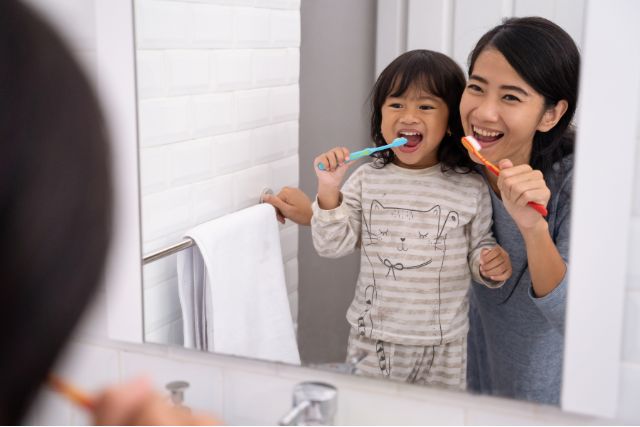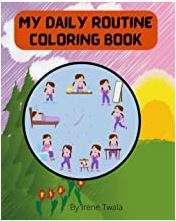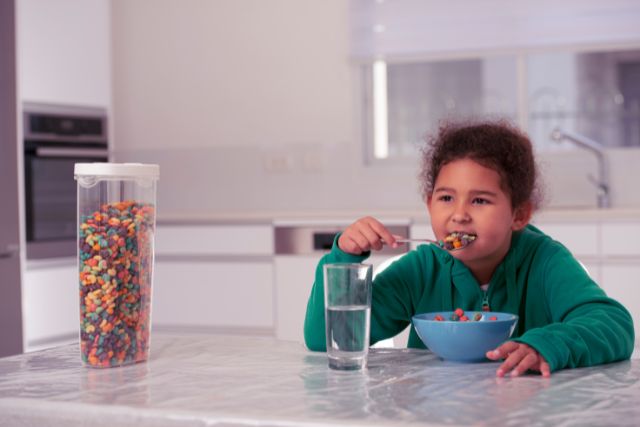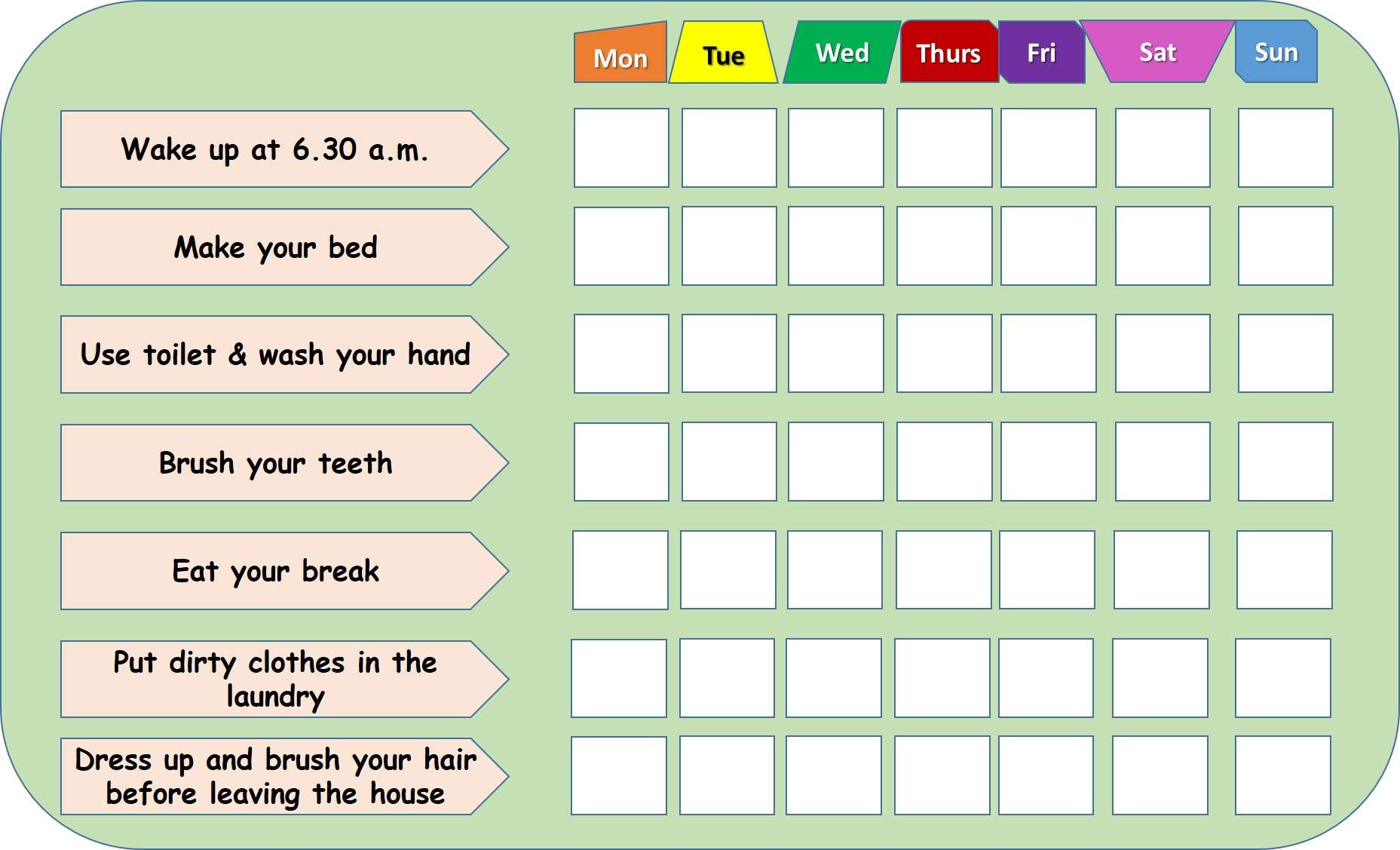Introducing transformative routine for kids – the secret formula to unlocking happiness and success in your child’s life. Dive into a treasure trove of tried-and-tested tips on how to create a structured, yet fun, daily routine that will not only set them up for future success, but also ensure a joyful, stress-free childhood.
Do you know that family routine for kids like those outlined in this simple coloring book are foundational to raising responsible adults?
Well.
I have met strict parents with rowdy kids. I’ve also met lenient parents with disciplined children.
This tells us that what we are as parents may not be as important as what we firmly reinforce in our children’s lives. Our children’s behavior does not grow from the soil but rather results from what we establish.
Daily routines are not something new. In fact, our forefathers used them to establish traditions. Institutions are using them to establish cultures. And you should use them to transform your kid into a self-made boss.
This article outlines the importance of routine for kids with a simple structural guide of establishing one.
But before we dive in, let’s first establish the basics of routines.
What is a Daily Routine For Kids?
A routine for kids is a sequence of actions that you follow regularly. It’s a series of activities that you repeatedly do until it becomes a habit. The core thing is; defined activities performed repeatedly.
Many families have defined ways of doing things. This is their traditions, rituals, or culture. They are unwritten scripts that family members live with either knowingly or unknowingly.
According to psychologists, having daily actions in sequence can help train your brain and body to carry out specific activities at a stipulated time –Circadian rhythms.
Think of the menstrual cycle or any other pattern in your body. You may realize that they’re all linked to circadian rhythms.
A good life example is a person accustomed to taking a cup of tea while watching the news before going to bed. If you repeat the same actions in a similar sequence long enough, it eventually creates an association that tells the mind to get in a particular zone.
Routine for kids are indicators of a family’s beliefs and values. It’s a way of showing how they expect their future generations to behave.
Do you want your kid to embrace tidiness? Create routines at an early age that drive his mind towards this zone.
Related: 7 Unwritten Baby Routines That Sustained My Sanity In the First 3 Months After Childbirth
Why is it Important to Establish Routines for Kids?
Routines have numerous benefits;
1. Routine for Kids Establishes Healthy Habits
Routines are simple actions that, when repeated, can turn into habits. Habits create paradigms. Paradigms run people’s life.
In fact, you can’t talk about Paradigms without habits. These habits begin to form from childhood environments and are important because they define how we perceive reality.
Establishing good habits as time management starts by creating routines in your child’s life that help manage his time.
2. It’s a way to establish a strong foundation for their life
Routines become you and often set the tone for your life. If you embed a pattern of letting your kids clean the table after meals before going out to play, they learn to accomplish important tasks before indulging in leisure.
I have seen adults cut their nails after three days simply because their mom used to do so in their childhood. This demonstrates how difficult it can be to break away from some values that were installed at an early age.
So,
Train your child in the way they should go and watch them transform into responsible adults.
3. Routines help kids to learn essential life skills
Daily patterns and routines can enhance your child’s social, emotional, and cognitive development. Repeating simple actions daily offers an excellent opportunity to furnish their life skills.
As you develop your routine plan, Incorporate self-care activities such as bathing, or arranging their closets. Don’t forget to incorporate wealth creation and debt management lessons as this affects the quality of their adult life.
Teaching life skills can help raise mentally, emotionally, and financially informed kids.
4. Helps to develop Confidence and Independence
Assigning duties to your kids can foster a sense of worthiness. This is true, especially if they can perform a task competently. In the long run, they develop confidence and independence as they learn to act without supervision.
According to research, routines can integrate kid’s learning with an “organized connection”. If they can connect with specific environments, adapting and learning becomes easy.
Also, involving your children in daily routines helps them feel that they are in control. They can thus, develop positive social skills and satisfaction in doing things for themselves.
5. Routines for Kids Creates Body Clock and Circadian Rhythm
Daily routines play a significant role in shaping your kid’s minds. The coordination of mind and body creates circadian rhythm in your child’s brain.
This is a natural way of stimulating and propelling their body towards performing a particular chore. And, by doing so, it becomes easier to follow a schedule, especially if the tasks follow a specific sequence.
For example, you can make it a routine for your school-going kid to brush his teeth before using the restroom. The action of brushing the teeth can always trigger his need to use the restroom. Consequently, telling bedtime stories can help your preschool fall asleep with ease.
6. Daily Routine for Kids Safety & Belonging
When you establish a routine, you set up a system as a family in your child’s mind. As they continuously interact with this system, they develop a sense of safety and belonging. This predictable home environment reinforces your child’s feeling of identity and security.
A predictable family routine can assist your child in coping with changes. They also help the child transit smoothly in different life phases. For example, they may be able to cope with the birth of a new child, divorce, or moving houses.
7. Routine for Kids Establishes Expectations
Family routines are a sure way of teaching kids about societal expectations. For instance, expecting your kids to tide up or take a bath daily from an early age sets the pace and becomes part of a natural way of being.
Setting expectations also eliminate power struggle between parents and kids. Everyone understands their role; how and when to perform the task.
8. Memory enhancement and learning
Activities, when done repeatedly, enhances and can support the development of memory. As your child focuses on one task after another, he creates associations in his mind.
Focusing and creating associations among things that you know is an excellent way of enhancing memory. This is because repetition supports the cognitive functioning of the brain. it also reduces forgetfulness.
9. Bonding and building relationships
Routines that incorporate fun family moments can be a great way to create and nature relationship.
When you spend time together, you foster a sense of belonging hence, strengthens family relationships.
For example, reading a story together before bed, sharing regular family meals, or having a kick with your child before soccer practice can be a unique way of sharing quality time with your kid.
The Umbilical Cord Care:How Best Can You Care For Your Baby’s Belly Button After Birth?
What are the Features of a Good Daily Routine For Kids?
Now that you understand the importance of family routines, it’s time to look into features.
As a family, you may value different aspects of life, such as finances, relationships, and health. Hence, a family routine should focus on your needs, interests, and values.
Basically, a good routine should have the following features.
- Well planned –have well-defined roles with specific expectations.
- Consistent; Good routines should be part of everyday family life.
- Predictable-Actions should happen in the same order each day.
- Flexible –should be able to adapt and adjustments as the needs change
- Enforcement – Should provide a way of following through and implementing the consequences, whether it’s a reward or a punishment
How Do You Establish a Perfect Routine for Kids?
We establish routines to better our lives. While it may be challenging for your kid to embrace the changes, it’s your duty to educate them about the possible gains they will get. The reward can be either immediate or something gained over time.
Here are simple steps you can follow to establish a perfect routine for your kids.
Step 1. Start by defining your goal
An effective routine should be about promoting the well-being of your kid. First, identify what value you want to install.
For example, do you want to teach tidiness, money or is it about establishing a sleep routine for a toddler?
As you set the goal, consider your child’s age and stage of development.
- Zone of development and Skill; Think of steps to teach the child which will enable him to move towards independence in the routine.
Step 2. Organize the goal into individual tasks
After identifying the culture that you want to build, break the goal into smaller orderly tasks. Set up a realistic time frame for performing the task, leaving room for adjustments whenever necessary.
- Consider involving older kids in the routine formulation process- Let them have a say about the individual activities to be performed as it creates a sense of goal ownership. It also makes a provision for both parties to express their thoughts and concerns.
- A balance between structure and flexibility is necessary- If enforcing the routine consistently increases the child’s distress, consider evaluating and adjusting.
- Inform them in advance and explain the reason why- It is good to prepare the kid, especially if they are of age. Inform them at least a week earlier of the changes.
- Anticipate the pain points and explain
- Highlight the benefits of the routine and your expected result.
Step 3. Begin enforcing
Since you hard already prepared your kid that by next week, it will be your duty to clear the table after dinner; begin enforcing from that date without falling for any excuse.
Step 4. Guidance and Boundaries
The best way to teach your kid is through practical guidance. It doesn’t matter whether he has been watching someone do it. Now that it’s his turn. Take him through step by step. Set your expectations right. Persist in checking whether he’s doing it right so that the skill is perfect at the end of the day.
Step 5. Reward
You can agree on incentives as a way of saying bravo for the efforts you’re putting in to learn and become a better family member. Consequently, you can impose and follow through with other consequences to ensure that your child adheres to routine.
Introduce another action
Once one task has been mastered, you can introduce another one. Only make sure that they form a sequence. A good example can be taking a nap after eating for toddlers and preschoolers.
According to psychologists, it can take you up to two months or even more before a new behavior becomes automatic. That’s roughly 66 days. Better still, the period can vary depending on the person and circumstances.
Studies suggest that it can take approximately 18 days to 254 days for people to form a new habit. Hence you should give your child a reasonable time before reviewing the progress.
Also, set short-term goals to give yourself and the kid a chance for quick wins. These small wins build confidence that you can accomplish your bigger goals.
Examples of Daily Routines for kids
Daily routine ideas for Toddlers and preschoolers
- Brushing teeth
- Washing their hands for 20 seconds
- Potty training
- Eating proper meals
- Screen time to sing along with cartoons
- Spending time playing
- Bathing time
- Telling stories
- Coloring and sorting out their toys
- Bedtime routine.
School going children: Daily routine ideas
- Waking up in the morning
- Making the bed
- Dressing up by themselves
- Arranging their closets
- Proper use of a restroom
- Caring for pets
- Watering plants
- Sweeping around the compound
- Participating in artistic activities e.g. jewel making
- Taking a bath
- Setting and cleaning the dinner table
- Unpacking the dishwasher
- Helping with the laundry
- Doing homework on their own
- Bedtime storytelling
- Saving in piggy banks
- Cooking simple foods
- Street smart behaviors
Related: How To Raise Financially Responsible Kids(Your Practical Guide)
Examples of morning routine schedules for school-age kids






